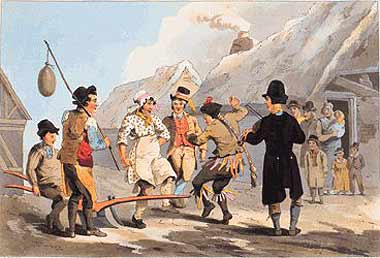 If you've read this month's Tudor Life magazine then you will know that today is St Distaff's Day. Never heard of it? Well, neither had I until I read Steve Roud's The English Year, a wonderful book on all the feast days and traditions celebrated throughout the English calendar year.
If you've read this month's Tudor Life magazine then you will know that today is St Distaff's Day. Never heard of it? Well, neither had I until I read Steve Roud's The English Year, a wonderful book on all the feast days and traditions celebrated throughout the English calendar year.
As you probably know, Plough Monday, the first Monday after Epiphany, was the day on which things would return to normal after the Twelve Days of Christmas and people would return to work, but St Distaff's Day was the traditional day for women to resume their spinning following the Christmas celebrations. Steve Roud explains that this day wasn't just about work, it was also fun. The young men would try to steal the women's flax and tow to burn them, while the women retaliated by soaking the men with water. 17th century Robert Herrick writes of this tradition in his poem "St Distaff's Day or the Morrow After Twelfth Night":
"Partly work and partly play
You must on St. Distaff’s Day:
From the plough soon free your team;
Then come home and fother them;
If the maids a-spinning go,
Burn the flax and fire the tow.
Bring in pails of water then,
Let the maids bewash the men.
Give St. Distaff all the right;
Then bid Christmas sport good night,
And next morrow every one
To his own vocation."
By the way, St Distaff wasn't actually a person or a saint, a 'distaff' was an implement used for spinning.
So, all you women out there need to get back to your spinning today and do make sure you throw water over any young men who try to distract you!



This is lovely! Thank you!